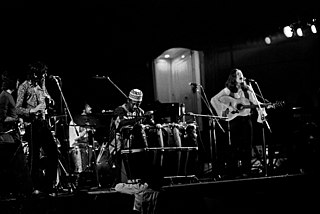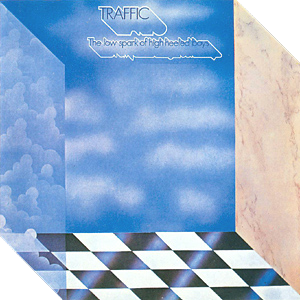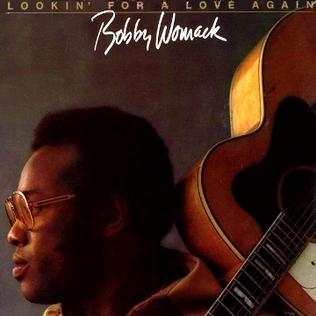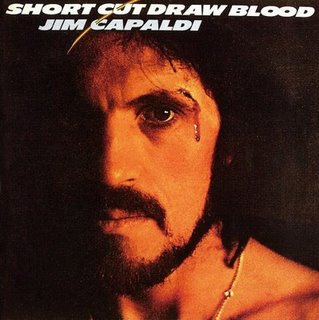
Traffic were an English rock band formed in Birmingham in April 1967 by Steve Winwood, Jim Capaldi, Chris Wood and Dave Mason. They began as a psychedelic rock group and diversified their sound through the use of instruments such as keyboards, sitar, and various reed instruments, and by incorporating jazz and improvisational techniques in their music.
The Concert for George was held at the Royal Albert Hall in London on 29 November 2002 as a memorial to George Harrison on the first anniversary of his death. The event was organised by Harrison's widow, Olivia, and his son, Dhani, and arranged under the musical direction of Eric Clapton. The profits from the event went to the Material World Charitable Foundation, an organisation founded by Harrison.

Nicola James Capaldi was an English singer-songwriter and drummer. His musical career spanned more than four decades. He co-founded the progressive rock band Traffic in 1967 with Steve Winwood with whom he co-wrote the majority of the band's material. He was inducted into the Rock and Roll Hall of Fame as a part of Traffic's original lineup.

Back in '72 is the sixth studio album by American rock singer-songwriter Bob Seger, released in 1973. It was the first new album on Seger's manager Punch Andrews' label, Palladium Records, to be released under their distribution deal with the Reprise division of Warner Bros. Records and one of three early Seger albums that has never been reissued on CD.

Beautiful Loser is the eighth studio album by American rock artist Bob Seger, released in 1975. This album marked Seger's return to Capitol Records after a four-year split. His previous record with Capitol was Brand New Morning in 1971.

Stranger in Town is the tenth studio album by American rock singer Bob Seger and his second with the Silver Bullet Band, released by Capitol Records in May 1978. As with its predecessor, the Silver Bullet Band backed Seger on about half of the songs and the Muscle Shoals Rhythm Section backed Seger on the other half.
"The Low Spark of High Heeled Boys" is the title track from the 1971 album by British rock band Traffic, written by Jim Capaldi and Steve Winwood. Despite never being released as a single due to its long duration, it became a staple of North American AOR-format FM radio stations in the 1970s and still receives airplay on classic rock radio today.

The Low Spark of High Heeled Boys is the fifth studio album by English rock band Traffic, released in 1971. The album was Traffic's most successful in the United States, reaching number 7 on the Billboard Top LPs chart and becoming their only platinum-certified album there, indicating sales in excess of one million. However, it failed to chart in the United Kingdom. The album features the minor hit "Rock & Roll Stew" and the title track, which received heavy FM airplay.

Mr. Fantasy is the debut album by English rock band Traffic, released in December 1967. The recording included group members Jim Capaldi, Steve Winwood, Chris Wood, and Dave Mason; Mason temporarily left the band shortly after the album was released. The album reached the number 16 position in the UK Albums Chart, and number 88 on the Billboard Top LPs chart in the United States.

Mellow Yellow is the fourth album from Scottish singer-songwriter Donovan. It was released in the US in February 1967 (Epic Records LN 24239 / BN 26239, but not released in the UK because of a continuing contractual dispute that also prevented Sunshine Superman from a UK release. In June 1967, a cross-section of both albums was released as Sunshine Superman in the UK. "Mellow Yellow" was the name of Donovan's hit single released the previous November.

Shoot Out at the Fantasy Factory is the sixth studio album by English rock band Traffic released in 1973. It followed their 1971 album The Low Spark of High Heeled Boys and contained five songs. Shoot Out, while achieving poorer reviews than its predecessor, did reach number six on the Billboard Pop Albums chart, one space higher than Low Spark had peaked in 1972. Like its predecessor, the original jacket for the Shoot Out LP had its top right and bottom left corners clipped. The album was remastered for CD in 2003.

On The Road is the second live album by English rock band Traffic, released in 1973. Recorded live in Germany, it features the Shoot Out at the Fantasy Factory band, with the Muscle Shoals Rhythm Section of keyboardist Barry Beckett, bassist David Hood, and drummer Roger Hawkins.

Replay is a compilation album by Crosby, Stills & Nash, appearing in 1980 on the Atlantic Records label. It contains no material with Neil Young, but does include CSN solo projects. It peaked at No. 122 on the Billboard 200, their first album not to chart in the top ten.

Steve Winwood is the debut solo studio album by blue-eyed soulster Steve Winwood. It was released in 1977, three years after the break-up of his former band, Traffic. Though the album sold moderately well in the US, it was a commercial disappointment compared to Traffic's recent albums, peaking at number 22 on the Billboard 200 album chart. In the UK, however, while Traffic's recent albums had only been moderately successful, Steve Winwood reached number 12 on The Official Charts. Island Records launched two singles from the album, "Hold On" and "Time Is Running Out", both of which failed to make the charts.

Leon Russell and the Shelter People is the second solo album by the singer-songwriter and multi-instrumentalist Leon Russell. Released in 1971, it peaked at number 17 on the Billboard Hot 200 in the United States. The album has gold certification for sales of over 500,000 albums in the US and Canada.

Lookin' for a Love Again is the sixth studio album by American musician Bobby Womack. The album was released on January 11, 1974, by United Artists Records. The album reached #85 on the Billboard U.S. Pop Charts and #5 on the Billboard R&B Charts. It included the hit single "Lookin' for a Love", which charted No. 1 on the Billboard R&B Singles chart and #10 on the Billboard Hot 100.

Best of Traffic is a compilation album by the band Traffic, released in 1969.

Oh How We Danced is the debut studio album by the British musician Jim Capaldi. The album was recorded while Traffic was on hiatus due to Steve Winwood's struggles with peritonitis and was released by Island Records in 1972. Like his contemporary albums with Traffic, it was unsuccessful in his native United Kingdom but did better in the United States, reaching number 82 in the Billboard 200 chart and producing the hit single "Eve", which reached number 91 in the Billboard Hot 100.

Short Cut Draw Blood is the third studio album by the British musician Jim Capaldi, released by Island Records in 1975. It marked a major turning point in Capaldi's career: it was his first album recorded after the breakup of Traffic, and more importantly it was his commercial breakthrough. While Capaldi's first two solo albums had been moderately successful in the United States, Short Cut Draw Blood entered the charts in several other countries for the first time. This was particularly evident in his native United Kingdom; the single "It's All Up to You" at number 27, released a year before the album, became his first top 40 hit there, only to be overshadowed the following year by his cover of "Love Hurts", which went all the way to number 4.

Fierce Heart is the eighth solo album by British musician Jim Capaldi. The album has a far more synth-heavy approach than any of his previous albums, though the songs are mostly in the same aggressive rock/pop vein that Capaldi had long been associated with. This synth-heavy pop sound was exactly what 1980s audiences were looking for, and the songs "That's Love" which broke the top 40 in the US at number 28, and "Living on the Edge" at number 75, became hit singles. The album itself reached number 91 on the Billboard 200.

















